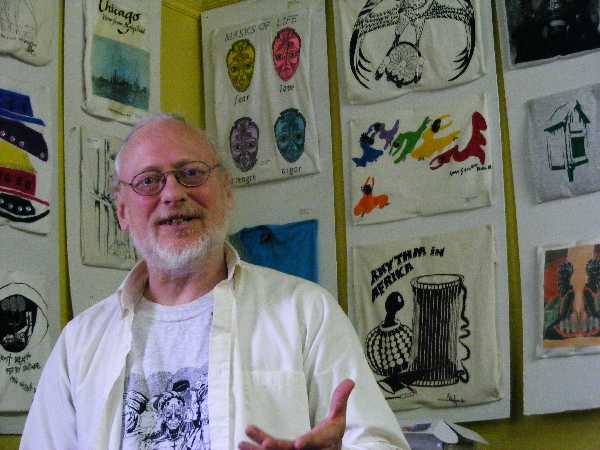Update on this story: Chris Drew will be back in court at 26th and California, room 602 on Friday at 10 a.m. Drew will be printing and giving away art patches that afternoon at Chicago Critical Mass from 4 to 6 p.m. in the Picasso Plaza, on the West Side of the building in the shade.

Room 602 is a “raggedy-ass” courtroom, according to a woman who sat with friends on the wooden benches of the gallery.
High ceilings and stone-walled, the floor has cheap plastic tiles and the overhead lights give everything inside a yellow hue. The old wooden benches inside are hard and uncomfortable. Sound echoes inside as hard soled shoes walk down its center aisle.
Mark Weinberg, one of Drew’s defense attorney’s, moves quickly to the bench asking the clerk to call the case.
Drew, an artist with studios at the American Indian Center, 1630 W. Wilson Ave., Chicago, was arrested in December on State Street near the Macy’s Department store. His initial crime was attempting to sell art in a part of the city where street vendors are prohibited.
The arrest was orchestrated by Drew in an attempt to test the local municipal codes that restrict street vendors from selling their wares in certain parts of the Chicago.
Nancy Bechtol’s video about Chris Drew
At the time of his arrest Drew was carrying a recording device, it was on his person and he was recording the event, which is a violation of the law. In addition to Drew’s recording, there were also photographers and journalists recording the arrest on the sidewalk.
Drew was charged with a felony for recording the officers without their permission. If he is found guilty he could be sentenced to prison. The original charge against Drew, of peddling, has been dropped.
Weinberg, one of Drew’s attorney’s, has made a motion to continue the case. Weinberg explained that he is seeking the advice of people “smarter than me” on how to handle the case.
In his statement, he said no one really wants to see Drew sent to prison for the recording. He said the lines are blurred because of the increasing use of camera phones and surveillance cameras. He added that home-made videos of police in action are more common than ever. But in Chicago, the police are not willing to give up the protection provided by Illinois law against recording them without their consent.












Be First to Comment